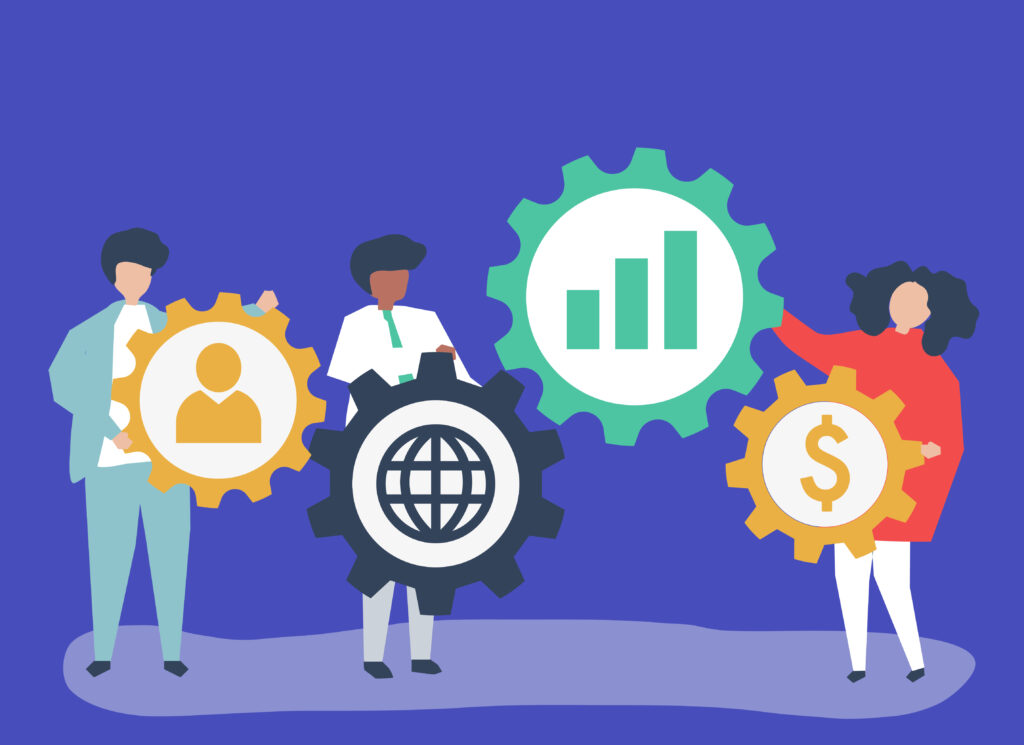In today’s evolving business environment, agility and adaptability are vital. This is why organizations are turning to integrated Workday solutions to stay competitive.
According to recent industry reports, the global market for integrated HR software will continue to grow. It will rise at a CAGR of over 10% in the coming years. This underscores the growing demand for unified platforms like Workday software.
Workday solutions has emerged as a frontrunner with over 40 million users. Its intuitive interface, robust feature set, and scalability make it a preferred choice for businesses across diverse industries. According to Workday’s customer satisfaction survey 2021, they achieved 97% customer satisfaction.
As a leading cloud-based finance and HR solutions provider, Workday offers effective tools for efficient management. This blog post delves into the importance of integrating Workday solutions. Further, we will explore its benefits and provide real-world examples.
Understanding Workday Solutions

Workday is a versatile platform encompassing finance, HR, and planning functionalities. It is a centralized hub for organizations to manage various operations. From workday accounting software and payroll processing to talent management, it offers a range of modules.
Additionally, to meet the diverse needs of modern enterprises, it allows proper modifications too. This further improves the overall working and results as a whole.
Integrating Workday solutions is vital for businesses. By connecting finance and human resources functions, organizations can gain the following:
- Break down data silos.
- Gain holistic insights into their operations.
- Streamlines processes for better strategic decision-making.
Importance of Workday Implementation
Implementing Workday can significantly improve an organization’s operational efficiency, data accuracy, and decision-making capabilities. A successful Workday implementation allows for streamlined processes, improved data management, and better alignment of business strategies with organizational goals. The importance of a well-executed Workday implementation lies in its potential to transform the way a business operates, ultimately leading to increased productivity and competitive advantage.
Key Features of Workday Solutions

Workday solutions boast many features. It helps to streamline finance and HR operations while empowering organizations with actionable insights. From comprehensive financial management to robust human resources functionalities, Workday offers a suite of tools that cater to the diverse needs of modern enterprises.
So, here are the main features of Workday solutions that you should know about:
-
Finance Management:
Workday’s financial management module serves as a key foundation for organizations looking to strengthen their financial strategies. Firstly, this module simplifies complex accounting tasks, such as managing accounts payable, accounts receivable, and the general ledger.
Secondly, Workday Solutions provides finance teams with robust tools for efficient budget management. This additionally includes real-time insights into spending trends and deviations. Lastly, Workday’s advanced reporting features offer stakeholders valuable, actionable information. This enables them to make informed decisions that promote financial health and growth.
-
Human Resources:
At the core of successful organizations is a strong and flexible workforce. Workday HR plays a key role in developing talent and enhancing productivity. Firstly, it simplifies HR tasks like hiring, onboarding, and managing talent by automating them, which cuts down on paperwork.
Secondly, Workday’s tools for assessing performance let managers give feedback and advice promptly, promoting ongoing growth. Lastly, by keeping all employee data in one place, Workday HR ensures accuracy and meets legal requirements. This also lets HR teams concentrate on strategic goals that lead to the company’s success.
-
Integration Capabilities:
In today’s interconnected business world, seamless system connectivity is paramount for operational efficiency. Workday solutions and integration framework stand out as a robust and adaptable solution.
It facilitates frictionless data exchange between Workday and other business systems. Whether integrating with legacy applications, third-party software, or emerging technologies, Workday’s flexible architecture ensures compatibility and interoperability.
This seamless integration enables organizations to leverage the full spectrum of their technology stack, maximizing efficiency and driving innovation. With Workday solutions as the central hub for data aggregation and analysis, businesses can unlock new insights and opportunities. This will additionally help businesses in propelling toward sustainable growth and success.
Benefits of Workday Solutions and Its Integration

Integrating Workday is like fitting puzzle pieces together—everything just clicks. It means smoother operations, better decisions, and teams working together seamlessly. It’s not just about connecting data; it’s about making every part of your business work smarter.
Some of the benefits of integrating Workday solutions are as follows:
-
Streamlined Processes:
Integrating finance and HR functions in Workday solutions streamlines business operations. It breaks down walls between departments, enabling finance and HR teams to work together smoothly. This synergy optimizes workflows and speeds up decisions. The integration cuts out unnecessary steps and manual work. It frees up resources for strategic projects that promote growth.
For instance, integrating finance and HR in Workday has revolutionized how teams operate in the IT industry. Previously, isolated departments led to repeat work and delays. With Workday solutions, finance and HR teams now collaborate without friction. This change has made workflows more efficient and decision-making faster. Companies can now focus more on initiatives that drive growth.
-
Data Accuracy:
Workday’s integrated data flows are a cornerstone for maintaining data integrity and compliance standards. By centralizing financial and HR data within a single platform, Workday solutions mitigate the risk of data discrepancies. This ensures adherence to regulatory requirements. Workday’s robust audit trails and security protocols also provide transparency and accountability.
For example, maintaining data integrity is paramount in the healthcare industry to ensure patient safety and regulatory compliance. Before Workday integration, disparate data analytics systems often resulted in data discrepancies and manual errors.
With Workday solutions integrated data flows, organizations now centralize financial and HR data. This ensures accuracy and compliance with regulatory requirements, providing stakeholders and regulatory bodies with confidence in the organization’s data integrity.
-
Strategic Insights and Forecasting:
Access to real-time insights and analytics empowers organizations to anticipate trends and proactively respond to market dynamics. Workday solutions offer advanced reporting capabilities for actionable insights. By using predictive analytics and scenario modeling, organizations can mitigate risks, capitalize on opportunities, and drive sustained business growth in an increasingly competitive landscape.
In the retail sector, companies use Workday’s sophisticated reporting features to outpace market trends. Through real-time analysis, they pinpoint customer preferences and market shifts.
For instance, predictive analytics highlighted an uptick in demand for eco-friendly products. Consequently, firms adapted their inventory strategies, resulting in higher sales and an expanded market presence. This strategic use of data underscores the power of informed decision-making using Workday solutions.
-
Enhanced Compliance and Risk Management:
Workday integration strengthens compliance and risk management by centralizing control and visibility. Its built-in features ensure adherence to regulations, while real-time monitoring identifies and addresses risks promptly, minimizing exposure and protecting reputation.
Furthermore, real-time monitoring and reporting capabilities enable organizations to proactively identify and address potential risks. This way, Workday solutions minimize exposure and effectively safeguard against reputational damage.
In the finance industry, regulatory compliance is non-negotiable. Workday integration has changed compliance and risk management practices. With built-in compliance features and audit trails, organizations ensure compliance to regulatory requirements. For instance, real-time monitoring alerts flagged a potential breach in customer data security. Prompt action will thus mitigate the risks and protect the organization’s reputation.
-
Cost Savings and Efficiency Gains:
Integrating Workday not only saves costs but also enhances efficiency by merging systems and automating tasks. Firstly, with fewer systems to manage, there’s a significant reduction in IT overhead, freeing up resources for more strategic initiatives.
Secondly, streamlined processes shorten cycle times and elevate productivity, translating into cost savings and enhanced overall performance. Specifically, in the manufacturing sector, companies have seen substantial cost reductions and efficiency improvements post-workday integration.
For example, adopting Workday halved payroll processing times, leading to notable cost savings and a stronger bottom line. These examples underscore Workday’s role in driving operational excellence and financial health.
Companies that are Leveraging Workday Solutions

Companies across various industries recognize the Workday program‘s transformative potential in revolutionizing their operations. Workday claims to have more than 10,000 customers globally.
Workday Financial Management software:
- First Financial Bank
First Financial Bank is with headquarters in Cincinnati, Ohio, USA. It operates as a full-service bank. Banks must adhere to numerous regulations, necessitating continuous monitoring of various factors.
The decision to implement Workday financials and offer Workday Finance training to employees has proven highly beneficial for First Financial Bank. This has streamlined the process of generating and presenting data. It significantly reduces the time and effort required for retrieving and analyzing data to meet regulatory requirements.
Workday’s Human Resource Management Software:
- The RealReal
Acknowledging the demand for seamless operations in their vibrant industry, The RealReal, a San Francisco-based apparel retailer, embarked on an innovative approach.
By embracing Workday’s payroll software, RealReal has significantly streamlined its payroll operations, guaranteeing precision and efficiency in handling employee compensation. This strategic move has not only simplified administrative duties but also facilitated improved resource distribution and enhanced employee contentment.
Consequently, RealReal has witnessed marked advancements in operational effectiveness and workforce management. Furthermore, these changes have played a crucial role in bolstering its position in the competitive retail sector, contributing to its ongoing success.
Workday Integration Examples:
According to 6sense, a leading data intelligence platform, over 561 companies have embraced Workday integration in 2024, marking a significant trend towards unified business solutions. Among these adapters are prominent organizations like: Equifax Inc., Banner Health, Accenture, Change Healthcare Inc., and Walmart, Inc.. All these are signalling a widespread recognition of Workday’s transformative capabilities.
This surge in adoption underscores the growing importance of integrated platforms in driving operational efficiency and strategic decision-making across diverse industries.
The Future of Workday Solutions

Workday solutions promise transformation through constant innovation and adaptation. Further, it offers key developments that improve user experiences and productivity. This extends cloud services for flexibility. Consequently, these advancements enable organizations to remain competitive in the rapidly changing business landscape.
Based on the same, the key aspects to note include the following:
- Artificial Intelligence and Machine Learning:
Workday solutions integrate AI and machine learning capabilities further into its platform. This will enhance automation, predictive analytics, and personalization. This further allows organizations to make smarter decisions and improve efficiency.
- Enhanced User Experience
Workday solutions will likely enhance user experience across its platform. This will further make it more intuitive, personalized, and accessible. This will empower users to navigate complex tasks better. Additionally, it will drive higher organizational adoption rates.
- Expansion of Industry Solutions
Workday will continue to expand its industry-specific solutions. This will help cater to the unique needs of various sectors, from healthcare to manufacturing. This will enable organizations to leverage tailored solutions. It will then be able to address specific industry challenges and requirements.
- Global Expansion
Workday’s global footprint will grow as it reaches new markets and regions. This expansion will include localization efforts. The aim is to accommodate diverse languages, currencies, and regulatory requirements. This will additionally ensure seamless adoption worldwide.
Workday Solutions For Better Results!
In conclusion, integrating Workday services presents significant advantages for organizations striving to enhance their finance and HR operations. From streamlining processes to facilitating data-driven decision-making, Workday catalyzes organizational transformation.
However, navigating the complexities of Workday integration isn’t simple, so partnering with an expert IT company becomes invaluable. With their expertise, businesses can fully leverage Workday’s capabilities and drive innovation and growth. This is further important in today’s competitive landscape, backed by real-world examples illustrating its transformative potential.
Frequently Asked Questions
What is Workday, and how does it benefit organizations?
Workday is a cloud-based platform offering integrated finance and human resources management solutions. By consolidating these critical functions into a single platform, Workday streamlines operations, enhances collaboration, and provides real-time insights for informed decision-making.
How does integrating Workday solutions optimize human resources and finance processes?
Integrating Workday solutions eliminates silos between HR and finance departments, allowing for seamless data exchange and collaboration. This integration enables organizations to streamline payroll, budgeting, talent management, and reporting processes. Further, this results in improving efficiency and productivity.
What are some common challenges organizations face when integrating Workday solutions?
Some common challenges include data migration complexities, customization requirements, and user adoption issues. Additionally, organizations may encounter integration hurdles when connecting Workday with existing legacy systems or third-party applications.
How can organizations ensure the successful integration of Workday solutions?
Successful integration requires thorough planning, stakeholder engagement, and effective change management strategies. Organizations should invest in comprehensive training programs. This will ensure users have the right skills. It will also help to establish clear communication channels.
What are the key features of Workday that organizations should leverage for optimization?
Key features of Workday include finance management tools for budgeting, accounting, and reporting. It also includes HR functionalities for recruitment, performance management, and employee data management. Organizations should also explore Workday’s integration capabilities, such as Workday web services and APIs. This will further allow us to connect with other business systems and maximize efficiency.
How can integrating Workday solutions drive business growth and agility?
Workday integration offers real-time insights and simplified processes for fast adaption to market changes. It enables data-driven decisions, helping organizations seize opportunities and reduce risks. This agility further allows businesses to stay competitive. This will position them for sustained growth in today’s dynamic business landscape.












